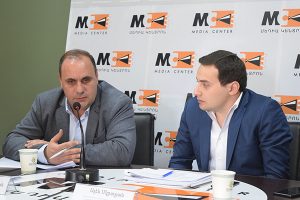Video: © 2019. Media Centre Yerevan. Discussion “Discussion on the activities implemented by the Armenian MoD within the framework of 2017-2019 Action Plan derived from the National Strategy for Human Rights protection.” (In Armenian)
On November 6, 2019, at the Media Center in Yerevan, Peace Dialogue NGO presented the final report on the activities implemented by the Armenian Ministry of Defense within the framework of 2017-2019 Action Plan derived from the National Strategy for Human Rights Protection prepared by the Monitoring Group formed in the scope of the organization’s project Proactive Civil Society Participation in the Protection and Promotion of Human Rights in the Armenian Military Forces.
Edgar Khachatryan, President of Peace Dialogue NGO; Artur Hovhannisyan, MP, Member of the Standing Committee on Protection of Human Rights and Public Affairs; Alen Mkrtchyan, Deputy Head of the Department of International Legal Cooperation of the Armenian Justice Ministry; and Aleksandr Avetisyan, Head of the Armenian Defense Ministry’s Human Rights and Integrity Building Center, all took part in the event.

Edgar Khachatryan presented the Monitoring Group’s final report (the latter built on findings from an interim project report published after the first half-year of project activities) in which lawyers, journalists, human rights defenders, and representatives of various CSOs working in Armenia were involved in developing.
The Monitoring Group observed implementation of the Defense Ministry’s 2017-2019 Action Plan as part of the government’s National Human Rights Strategy and developed its own, independent efficiency indicators for each are monitored. This is because, after studying the plan, the Monitoring Group concluded that there were problems with the measurability of the impact of individual activities and operations. That is to say, it was difficult to measure the effectiveness of specific actions and the extent to which they promoted, or will promote, the protection of project beneficiaries’ interests or individual legal rights. When presenting the report, E. Khachatryan spoke about issues raised during the monitoring process. He noted that certain issues brought up are of a legal nature, while others pertain primarily to law enforcement practices.
“Since the adoption of a legal act was an example of an indicator for measuring the effectiveness of specific activities in the Action Plan, we did not only seek to verify the act’s actual impact. Rather, we tried to analyze the implementation of new norms from a legal perspective: to find out what issues we believe to be important as concerns application of the legal act (law) and in subsequent law enforcement practice. We looked specifically at how new legal acts were implemented in an effort to contribute to the protection of stakeholder rights”, explains E. Khachatryan.
Despite having taken into consideration the specificities of the field (human rights in the Armenian armed forces), in many cases, the Monitoring Group was denied the opportunity to work with the project’s primary target audience. Nonetheless, the Monitoring Group team still managed to engage with 290 military conscripts.
Aleksander Avetisyan, Head of the Armenian Defense Ministry’s Human Rights and Integrity Building Center (the center that also coordinates the activities of the Ministry of Defense information hotline), stated he was aware of the issues raised in the report and noted that if these issues did not exist, there would be no need to create a Human Rights and Integrity Building Center run by the Ministry of Defense. He also commented on the methodology and research sampling used for the monitoring. He disagreed with a number of other points outlined in the report and presented the basis for his position or views and offered clarifications thereof.
Alen Mkrtchyan, Deputy Head of the Department of International Legal Cooperation at the Armenian Justice Ministry, presented the functions of the ministerial department primarily responsible for developing the Ministry’s 2017-2019 Action Plan based on the Government Action Plan derived from the Human Rights Protection Strategy.
In MP Artur Hovhannisyan’s opinion as well (he is a member of the Armenian Parliament’s Standing Committee on Protection of Human Rights and Public Affairs), the monitoring process faced considerable obstacles in terms of methodology. According to him, there could be problems separating out systemic problems in the way used by the Monitoring Group.
“The issues mentioned in the report do indeed exist, and my colleagues will confirm that there are such problems. However, we must understand whether these problems are systemic or situational”, he said.
Meeting participants emphasized the importance of civil society monitoring, and they expressed willingness to work together in developing the next three-year action plan. According to Artur Hovhannisyan, the National Assembly acknowledges that civil society is its valid partner and, if necessary, is ready to assist in monitoring actions deriving from the government’s Human Rights Strategy.



